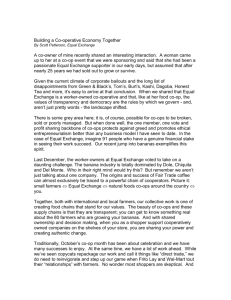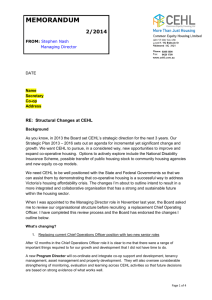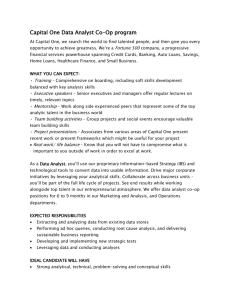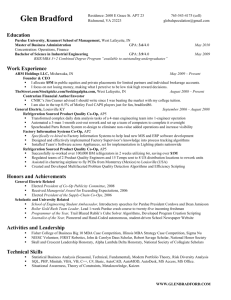Steps for Starting a Cooperative - University of Wisconsin Center for
advertisement
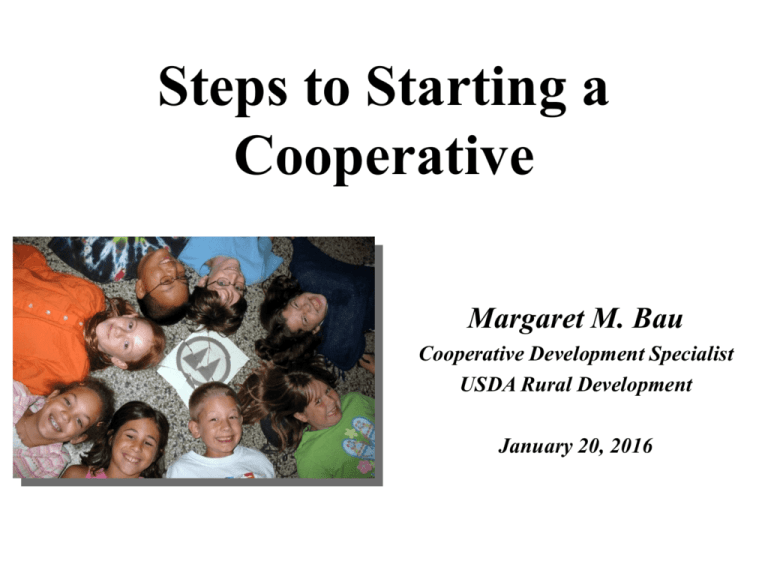
Steps to Starting a Cooperative Margaret M. Bau Cooperative Development Specialist USDA Rural Development January 20, 2016 Ways to Form a Co-op Member Initiated Incubated Conversion Start up idea dreamed up and explored by the eventual members Start-up idea incubated by a development group and transplanted among recruited members Transfer an existing business to shared ownership - Following a recipe - Taking a cooking class - Succession planning - “Making lemonade” Steps to take when working with a Member Initiated Co-op Analogy of cooking with the help of a recipe It All Starts With… Idea! Could a group effort address the issue? 4 Explore the Idea What is the business concept? Is a co-op the best structure to meet our shared need? Discuss the idea in a “Margaret Mead” group 5 “Never doubt that a small group of thoughtful, committed citizens can change the world; indeed, it’s the only thing that ever has.” -Margaret Mead 6 Gather Information • Co-op structure – – – – – What is a co-op? Co-op vs other legal structures? Other co-ops in industry and region Co-op principles and values Ownership culture, participatory democracy • Discuss your mission and values • Indentify resources – Project coordinator (paid task master) – Co-op and business consultants • Define the business concept 7 Key Questions • Sound business idea? • Advantage to work as a group rather than alone? – Co-op model the best structure? • Idea worth doing? – Time, resources, and energy – Major difference in life? – Business, not a hobby 8 Exploratory Meeting At your discretion, depending on the project • Present the concept • If interest exists, form a STEERING COMMITTEE • Ask for earnest money – Cover organizing expenses – Good indicator of commitment 9 Decision Point • If… – Proposal is realistic – Co-op is a possible solution – People show interest • Then… – Proceed to feasibility study • If not… – STOP 10 Conduct a Feasibility Study • Is concept viable? – – – – – – Industry analysis Market potential Technical aspects Capital requirements Financial projections Scenarios • Independent analysis – Conducted by 3rd party Decision Point • If… – Concept seems viable – After thorough review, the steering committee wishes to pursue the business • Then… – Proceed to conducting a business plan • If not… – STOP 12 Conduct a Business Plan • Details of your venture – – – – – – Description of product Marketing plan Operations Management and organization Financial plan Equity and capitalization • Conducted internally – use information from feasibility study Decision Point • If… – Market potential is sufficient – Member participation is sufficient – Capitalization chances look reasonable • Then… – Proceed to incorporate • If not… – STOP 14 Legal and Policy Documents • Draft bylaws and articles of incorporation – Review by co-op attorney • Select incorporators – usually the steering committee – will serve as the interim board • Incorporate with a state • Develop policies and controls – – – – Your State Statutes (or a co-op friendly state) Accounting checks and balances Personnel policy handbook Membership agreements Board policies (conflict of interest) 15 Organizational Meeting • Present findings of the feasibility study and business plan – answer questions • Adopt bylaws • Elect Board of Directors • Collect member equity 16 Funding a Co-op • Membership equity – Initial – Annual • Transaction fees – Per unit retains (i.e. 5% surcharge on each item sold) – Hourly withholding (worker co-ops) • Equity drive – Common stock to members – Preferred stock – to members and community investors – very limited voting rights • Subsidized loans, grants – Loans from members • Market rate loan 17 Business Start-Up • Immediate tasks after incorporation – Tax ID number, • IRS Subchapter T: “farmer co-op” – board & business insurance – any licenses – workers compensation • Hire manager – Manager hires other employees • Acquire facilities, equipment 18 Begin Operations This is just the beginning… 19 Get Co-op on It’s Feet • Board training - foster long term thinking – Model good board behavior and policies – Strategic plan – Annual manager review – Board self-evaluation • Member education and involvement – Require co-op education for membership – Committees, conference calls • Annual membership meeting 20 Member Initiated Co-op Follow the recipe How about a Cooking Course? Getting to scale in specific industries Sectors with Cooking Shows • Several industry sectors enjoy targeted co-op development assistance – Historical - Rural Electric Cooperatives • 1935 Rural Electric Administration • Extensive federal government loans • Network of co-op developers and local groups – Today - Food Co-op Initiative • • • • Retail natural food consumer co-ops Extensive industry knowledge Network of technical assistance Limited seed money Incubated Co-op (of new business ventures) Analogy of growing tomatoes in northern climates Examples of Incubated Co-ops (new business development) • Co-op development in a specific industry – Arizmendi bakeries in San Francisco, CA • Co-op development with targeted groups – Prospera with Latina immigrants in Oakland, CA – Initially house cleaning, now food production • Co-op development in a region – Evergreen Co-ops in inner city Cleveland • Underemployed, people with blemished records • Anchor institution approach – Select industries to supply local hospitals, universities Incubating a Co-op… • Sponsoring organization comes up with idea: – Picks industry, does feasibility study – Conducts market analysis and business plan for proposed co-op sites – Figures out financing – Go/No Go decision point • If go - Sponsor recruits members to proposed co-op Recruiting Members • Advertise positions • Require co-op training – Co-op principles – Understanding financials • Personal • Business – Democratic workplace • Provide task specific training • Mentor operations management • Open for business – Ongoing care of co-op board and membership – Ongoing support of business Pros and Cons of Incubated Co-ops Strengths • Proven industry • Streamlined financing • Member perspective: – Quicker start-up – Less burn-out of leadership – People with limited business experience can still enjoy ownership Weaknesses • Group trust building process missing • Member perspective: – Idea isn’t from the members – Members may not have deep industry knowledge – Danger of “convenient” membership and employee mentality Converting an Existing Business to Cooperative Ownership Examples of Conversions • Consumer Co-ops – manufactured home parks • ROC USA • Worker Co-ops – Retiring owners (succession planning) • Select Machine, Kent, OH – Current owners expanding ownership to employees • Real Pickles, Greenfield, MA Ideal Environment for Conversion • Willing seller – Owner wants to phase out of the business – Concerned about business legacy – No logical successors • Willing buyers – Business has a major impact on their lives • Viable business – Profitable business, limited debt – Industry has a future Conversion Steps Willingness… Current Situation… New Structure… Do the Deal… Summary Member Initiated Incubated Conversion Start up business - Members go through the steps of the entire start-up process Start-up business - Organization does development process - Hire and orient eventual owners Existing business - Evaluate viability and seller willingness - Members go through process steps For More Information Margaret Bau Co-op Development Specialist USDA Rural Development (715) 345-7615 ext. 171 Margaret.Bau@wdc.usda.gov 34 Crave co-op developer training? • Cooperation Works (all co-ops) – National network of co-op development centers and co-op development professionals – June 27-30, 2016, in Madison, WI • University of Wisconsin Center for Cooperatives • Contact Sarah Pike at info@cooperationworks.coop • Democracy At Work Institute (worker co-ops) – National think-and-do tank for worker co-ops – Worker cooperative start-up webinars • First Friday or the month through 2016 • http://institute.coop/startup – Nonprofits interested in incubating worker co-ops – 2016 Co-op Developer Fellowship Program





